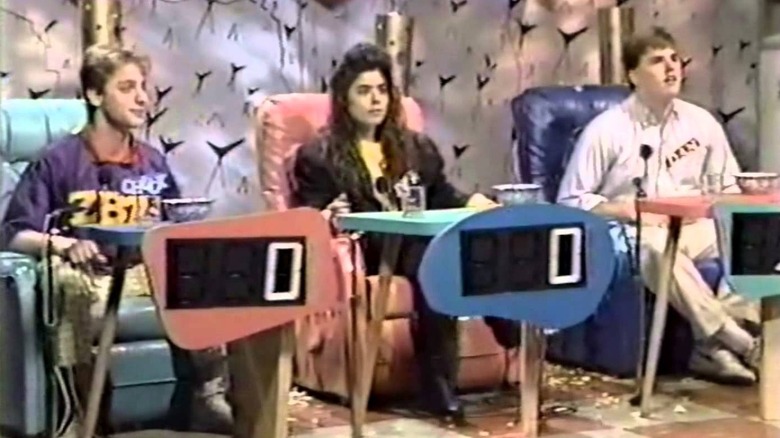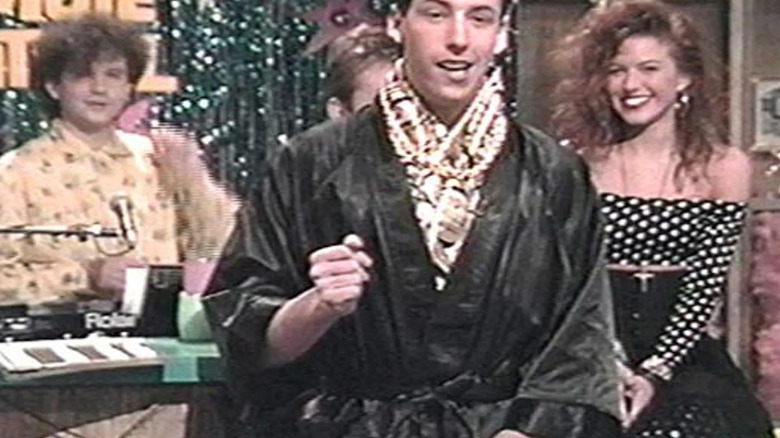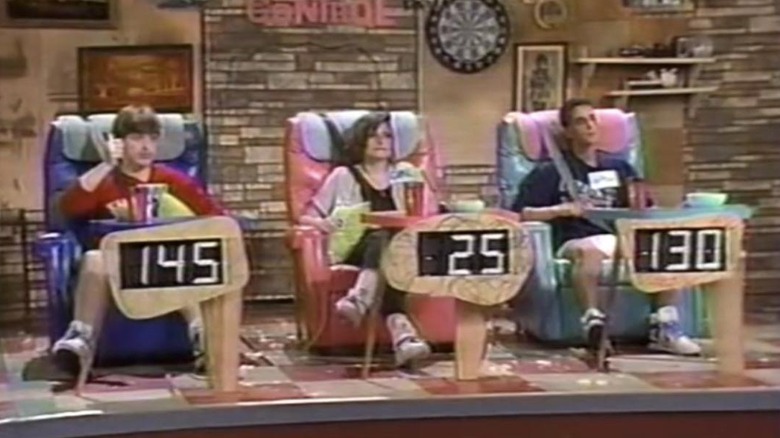MTV's First Original Series Was This Beloved Game Show
MTV launched on August 1, 1981, famously charging out of the gate with The Buggles' hit song "Video Killed the Radio Star." It was pretty presumptuous and cheeky for the suits at MTV to assume that their new network was instantly ripping apart an old media landscape, but they were eventually proven somewhat right. MTV became, for a prolonged spell, a brand new cultural fulcrum for Gen-X youths. The network didn't just randomly showcase hip music videos — a medium that exploded in popularity thanks to MTV's machinations — but carefully curated them, allowing viewers to appreciate certain genres, labels, or artists they may not have known otherwise. Some early MTV explorers may recall 1983's "I.R.S. Records Presents The Cutting Edge." Hosts would introduce blocks of videos and even take requests. The term VJ entered the pop lexicon.
Also, to round out their programming blocks, MTV ran multiple news segments and documentary shows, updating viewers on pop music as it was happening. The tone of these shows was generally non-formal, but the newsreaders and documentarians took their job seriously, trying to be as thorough and in-depth as possible. MTV was immediate and important, allowing the world of pop to expand and diversify and undercut the former world's old payola roll blues.
By 1987, the network was bigger than ever, and its snarky, satirical, quick-cutting attitude began to inform the culture at large. A stable of celebrities had grown up on MTV, and kids who were there for the first night of broadcast were now in college. The network had become self-aware, and many of their shows served as a commentary on TV itself.
Case in point: in 1987, the network's very first scripted program debuted. It was a game show called "Remote Control," a trivia series wherein contestants would sit in La-Z-Boy recliners and select whimsically named trivia categories from a CRT TV with their handheld remotes (something of a novelty at the time).
Remote Control turned TV inside out
"Remote Control" was hosted by Ken Ober and featured Colin Quinn as the show's announcer. In the show's first season, Marisol Massey starred as the Vanna-White-like co-host, while Kari Wuhrer took over the part for the second and third seasons. She was replaced by Alicia Coppola in season 4 (Alicia is, incidentally, not related to the Francis Ford Coppola dynasty), and finally by Susan Ashley in season 5. The show took place on a colorful, cluttered set adorned with the accoutrements of a "man-cave"-style basement. The contestants would sit in their easy chairs over to the right, while an outsize TV with questions on it was across the stage on the left; think of "Jeopardy!," but with none of the class.
Ober declared that the set was actually his own personal basement and that he transformed it into a game show studio to fulfill his dream of being a game show host. The opening theme song depicts Ober obsessing over TV, staring at the idiot box when his parents were scolding him as a child, or when women were trying to make advances as an adolescent. The theme of the show was that being raised on TV had saturated our brains with garbage water and made us dumber (and MTV happily implicated itself in this). Instead of real knowledge, we only had pop culture trivia. And if that was the case, we may as well have a little fun. There was a note of cynicism underneath the whimsy.
The show was pretty loose, in terms of its attitude (one can watch old reruns online), with Ken cracking wise, and the contestants not really taking the game very seriously. Ober would read questions (usually with a wisecrack), but sometimes the crew would enact a scene or sing a song that the contestant had to interpret. Sometimes, contestants would just have to endure a schoolyard humiliation like a wet willy or a purple nurple.
Remote Control was a huge hit
My favorite part of "Remote Control" was the Snack Break, which was just an intermission to the trivia where the contestants were given food. Like on Nickelodeon, it was dumped on their heads.
Several celebrities would pass through "Remote Control," many of them up-and-coming comedians. Some episodes feature the youthful faces of Denis Leary and Adam Sandler. Guest celebrities would pass through occasionally to help out with clues, including Nipsey Russell, LL Cool J, "Weird Al" Yankovic, Bob Eubanks, and Jerry Mathers. Later in the series, the show had become popular enough to boast charity episodes wherein celebrities would compete. Yankovic and LL Cool J competed against comedian and MTV VJ Julie Brown. The Red Hot Chili Peppers appeared on the show, as did Barry Williams, Eve Plumb, and Susan Olsen, all formerly of "The Brady Bunch."
And make no mistake, "Remote Control" was a hit. Its irreverence was infectious, and its trivia was legitimately hard; "Remote Control" made a head full of TV trivia feel temporarily useful. By 1989, the international versions of MTV launched their own counterparts of "Remote Control," and merch began appearing in stores. There was a "Remote Control" board game in 1989, and an NES game in 1990. Years later, one can still find the early "Remote Control" websites, revealing to the kiddos what the internet used to look like to us oldies.
The series ran five seasons in four years, finally leaving the airwaves in 1990. "Remote Control" left a legacy behind, however. It proved that MTV not only had its own unique attitude, but that its attitude could be wielded into original ideas. Their original shows began to include weird animated shows like "Liquid Television" the next year, and original scripted content like "Dead at 21" by 1994. MTV began to supplant its music video blocks with reality shows, game shows, and cartoons. The network became less music-oriented and more like an ongoing variety show. For a few precious years, it had everything.


